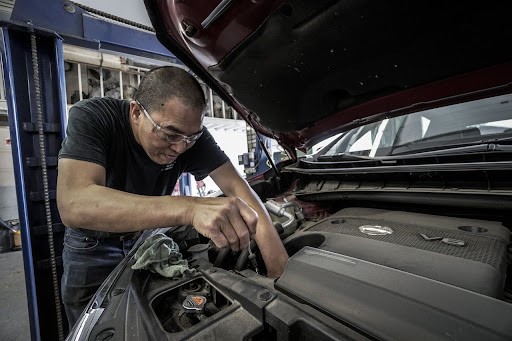 Embarking on starting your mechanic shop can be an exhilarating and challenging endeavor. It requires a blend of technical skills, business acumen, and a deep understanding of the automotive repair industry. But isn’t this blend exactly what transforms a mere space into a thriving business? Whether you’re a seasoned mechanic or a newcomer passionate about cars, this guide is designed to walk you through the essential steps to launch your mechanic shop successfully. In this venture, patience and persistence are just as vital as your wrench and screwdriver. Remember, every successful shop starts with a dream and a detailed plan.
Embarking on starting your mechanic shop can be an exhilarating and challenging endeavor. It requires a blend of technical skills, business acumen, and a deep understanding of the automotive repair industry. But isn’t this blend exactly what transforms a mere space into a thriving business? Whether you’re a seasoned mechanic or a newcomer passionate about cars, this guide is designed to walk you through the essential steps to launch your mechanic shop successfully. In this venture, patience and persistence are just as vital as your wrench and screwdriver. Remember, every successful shop starts with a dream and a detailed plan.
Understanding the Market and Setting Goals
Before you dive into the nitty-gritty details, understanding your area’s automotive repair market is crucial. Research is key. Look into the types of services in demand, the competition, and the needs of your potential customer base. This initial step is about identifying opportunities and setting realistic and attainable goals for your business. Think about what you want to achieve in the short and long term. Is it about becoming the go-to shop for specific repairs, or do you aim to offer a broad range of services? Please don’t underestimate the power of a well-defined business plan; it’s like a road map that guides you to your destination. As you set your goals, ensure they are measurable and time-bound, providing a clear vision for your business’s future.
Securing the Right Location
Location is more than just a place; it’s about accessibility, visibility, and convenience. A good location can significantly boost your shop’s chances of success. Consider traffic patterns, proximity to major roads or highways, and parking availability. It’s also essential to consider zoning laws and whether the space suits the type of work you plan to do. The ideal location strikes a balance between affordability and visibility; it’s not just about being seen but also about being easily accessible to your customers. Remember, your location speaks volumes about your business, so choose wisely.
Equipping Your Shop
 Starting a mechanic shop is not a small feat, especially regarding equipment. You’ll need various tools, from essential hand tools to more sophisticated diagnostic machinery. Investing in high-quality, durable tools can save you money in the long run. Remember safety equipment, which is crucial for protecting yourself and your employees. Additionally, consider the layout of your shop; it should promote efficiency and safety. A well-organized workspace improves productivity and leaves a good impression on your customers.
Starting a mechanic shop is not a small feat, especially regarding equipment. You’ll need various tools, from essential hand tools to more sophisticated diagnostic machinery. Investing in high-quality, durable tools can save you money in the long run. Remember safety equipment, which is crucial for protecting yourself and your employees. Additionally, consider the layout of your shop; it should promote efficiency and safety. A well-organized workspace improves productivity and leaves a good impression on your customers.
Ensuring a Safe and Efficient Work Environment
When setting up your mechanic shop, prioritizing the well-being of your workspace is paramount. Consider, for example, the installation of a dust collection system. This is critical in maintaining a clean and safe environment, adept at removing airborne particles and contaminants typical in a workshop. But the commitment to safety and efficiency should continue. Alongside dust collection, consider integrating proper ventilation, organized tool storage, and ergonomic workstations. Each element, from dust management to workspace organization, plays a critical role in ensuring health and safety compliance and boosting your shop’s operational efficiency and professionalism. These investments in infrastructure reflect your commitment to your employees’ health and enhance your workspace’s overall appeal and functionality, creating a more pleasant environment for workers and customers.
Hiring Skilled Personnel
Your team is your biggest asset. Hiring skilled and experienced mechanics is crucial, but so is finding employees who share your vision and work ethic. Remember, the quality of service your team provides will become the hallmark of your shop. Invest in training and update your team on the latest automotive repair techniques and technologies. Creating a continuous learning and improvement culture can set your shop apart from competitors. Also, please pay attention to the power of good customer service skills; your staff should be as proficient in communication as they are in car repair.
Managing Finances and Legalities
Starting a business involves navigating through a maze of financial and legal considerations. Financial management is critical to your business, from securing funding to managing cash flow to understanding tax obligations. It’s advisable to consult with financial and legal experts to ensure that all your bases are covered. Additionally, ensure you have the licenses and permits to operate legally. Keep meticulous records of all transactions and regulatory compliance; this diligence will be invaluable during tax season and legal matters. Also, consider insurance options to protect your business and assets; it’s better to be safe than sorry.
Marketing and Building Customer Relationships
In today’s digital age, a solid online presence is as essential as a traditional word-of-mouth reputation. Develop a marketing strategy including a professional website, social media presence, and local advertising. But beyond digital marketing, focus on building solid relationships with your customers. Excellent customer service, transparency, and trustworthiness will turn first-time customers into loyal patrons. Engage with your community through local events and sponsorships. Remember, a satisfied customer is the best advertisement for your business.
Adapting to Industry Trends and Technology
The automotive industry is continuously evolving. Stay abreast of the latest trends and technological advancements. Whether it’s new car models, developing automotive technologies, or changes in industry standards, being informed and adaptable is critical. This helps provide better services and positions your business as a forward-thinking and innovative establishment. Subscribe to industry publications and join professional groups; these can be invaluable sources of information and networking. Embrace technology not only in your repair work but also in your business processes; it can significantly enhance efficiency and customer satisfaction.
Planning for Growth and Scalability
As you establish your mechanic shop, planning for growth is essential. Think about how you can sustainably scale your operations. This might mean expanding your services, hiring more staff, or opening additional locations. Always keep an eye on your long-term goals and adjust your strategies accordingly. Growth should be a balanced blend of ambition and practicality. Don’t rush expansion, but don’t shy away; strategic growth can lead your business to new heights of success.
Conclusion
Starting your mechanic shop is a journey filled with challenges and opportunities. It requires a careful blend of technical expertise, business strategy, and a deep understanding of the automotive industry. By following these guidelines, you can lay a strong foundation for a thriving mechanic shop. Remember, success doesn’t happen overnight, but with dedication, hard work, and a customer-centric approach, your mechanic shop can become a staple in your community. As you embark on this exciting journey, keep learning, stay adaptable, and always strive to offer the best service possible. Your passion for cars and commitment to quality will set the tone for your business’s success.










